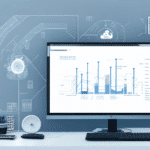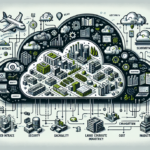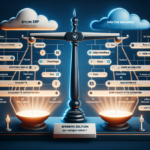Introduction to ERP Software
Enterprise Resource Planning (ERP) software is essential for integrating all facets of a business’s operations into a single unified system. This includes modules for inventory management, accounting, customer relationship management (CRM), manufacturing, and more. By consolidating these processes, ERP systems enhance efficiency, reduce operational costs, and facilitate better decision-making through comprehensive data analysis.
Modern ERP solutions offer real-time data and analytics, enabling businesses to monitor key performance indicators such as inventory levels, sales figures, and production schedules. This real-time visibility allows organizations to swiftly respond to market changes, optimize processes, and identify areas for improvement, thereby driving overall business performance.
SAP Business One Overview
SAP Business One is tailored for small to mid-sized businesses, offering a comprehensive suite of functionalities that cater to various business needs. Key features include financial management, sales and customer management, purchasing and inventory control, production planning, and business intelligence. Its user-friendly interface and robust customization options make it an attractive choice for companies with limited IT resources.
A significant advantage of SAP Business One is its seamless integration with other SAP products, such as SAP HANA and SAP Business ByDesign. This integration provides businesses with a holistic view of their operations and enhances data consistency across different departments. Additionally, SAP Business One offers mobile accessibility, allowing users to access critical data and reports remotely.
SAP Business One is supported by a vast network of resources, including online forums, training programs, and dedicated customer support. This support infrastructure is invaluable for small businesses, providing access to expert guidance and ensuring that users can maximize the software’s potential.
Infor CloudSuite Industrial (SyteLine) Overview
Infor CloudSuite Industrial, formerly known as SyteLine, is designed specifically for manufacturing businesses. It encompasses functionalities such as project management, supply chain management, quality control, and more. Renowned for its flexibility and scalability, Infor CloudSuite Industrial can handle complex manufacturing processes, making it suitable for businesses with intricate operational requirements.
One of the standout features of Infor CloudSuite Industrial is its ability to integrate with various systems and applications, ensuring seamless data flow across different departments. This integration capability enhances communication and collaboration within the organization. Additionally, the platform provides real-time visibility into production processes, enabling manufacturers to make informed decisions and swiftly address any disruptions in the supply chain.
Comparing SAP Business One and Infor CloudSuite Industrial
Cost
When evaluating ERP systems, cost is a crucial factor. Generally, SAP Business One tends to be more expensive than Infor CloudSuite Industrial. However, SAP Business One offers a wider range of advanced features and capabilities that may justify the higher investment for some businesses. In contrast, Infor CloudSuite Industrial is often viewed as a more cost-effective solution for small to medium-sized enterprises, particularly those focused on manufacturing.
Functionality
Both SAP Business One and Infor CloudSuite Industrial provide extensive functionalities, but their strengths lie in different areas. SAP Business One excels in advanced analytics and reporting, offering robust business intelligence tools. On the other hand, Infor CloudSuite Industrial is specialized in manufacturing and supply chain management, providing features tailored to the needs of production-centric businesses.
Deployment Options
Deployment flexibility is another important consideration. SAP Business One can be deployed both on-premise and in the cloud, offering businesses the choice based on their specific needs and infrastructure capabilities. In contrast, Infor CloudSuite Industrial is primarily cloud-based, eliminating the need for on-premise hardware and reducing maintenance costs.
Cloud deployment with Infor CloudSuite Industrial ensures high accessibility, allowing users to access the system from anywhere with an internet connection. This is particularly beneficial for businesses with remote or distributed teams.
User Interface
The user interface (UI) plays a significant role in user adoption and overall efficiency. SAP Business One is praised for its intuitive and user-friendly interface, which can be easily customized to fit the specific workflows of a business. Infor CloudSuite Industrial, while more complex due to its extensive manufacturing functionalities, offers a comprehensive set of tools that provide greater control over production processes.
Customization Capabilities
Customization is essential for tailoring ERP systems to meet unique business requirements. SAP Business One offers a wide array of customization options, including the ability to create custom fields, tables, and forms without extensive technical expertise. In contrast, Infor CloudSuite Industrial offers flexible configurations that are highly adaptable to specific manufacturing processes but may require more technical knowledge to implement effectively.
Integration Capabilities
Effective ERP systems must integrate seamlessly with other business applications. SAP Business One offers a broader range of integration options with third-party applications, making it a more flexible solution for businesses with diverse IT ecosystems. It includes pre-built integrations with popular platforms such as Shopify, Salesforce, and Magento, facilitating easy connectivity without the need for custom development.
Infor CloudSuite Industrial also supports integration but may require additional customization to connect with certain third-party applications, which could involve more time and technical resources.
Industry-Specific Capabilities
Infor CloudSuite Industrial is specifically engineered for the manufacturing sector, offering advanced features that address the complexities of production and supply chain management. This makes it an ideal choice for businesses in industries such as automotive, aerospace, and defense.
On the other hand, SAP Business One provides a versatile platform that can be adapted to various industries beyond manufacturing, including healthcare, retail, and services. Its built-in compliance features and comprehensive financial reporting capabilities make it suitable for businesses with diverse operational requirements.
Support and Training
Both ERP systems offer robust support and training resources, but they differ in their approach. SAP Business One provides a wide array of support options, including user forums, an extensive online knowledge base, and comprehensive training programs. This ensures that users have access to the information and assistance they need to effectively utilize the software.
Infor CloudSuite Industrial offers more personalized support solutions, such as dedicated technical account managers and on-site training programs. This tailored support can be advantageous for businesses that require hands-on assistance and customized training to fully leverage the system’s capabilities.
Feature Comparison: SAP Business One vs Infor CloudSuite Industrial
Both SAP Business One and Infor CloudSuite Industrial come equipped with a diverse set of features designed to enhance business operations. However, their focus areas differ, catering to different types of businesses.
SAP Business One offers advanced planning and analytics tools that enable businesses to gain deep insights into their operations. Its robust financial management and CRM capabilities support comprehensive business processes.
Infor CloudSuite Industrial shines in its manufacturing-centric features, including advanced production scheduling, supply chain visibility, and quality control. These features are crucial for businesses that manage complex manufacturing workflows and require stringent quality assurance measures.
Depending on the specific needs of a business—whether it prioritizes comprehensive analytics and financial management or requires specialized manufacturing capabilities—one ERP system may be more suitable than the other.
Pricing Comparison: SAP Business One vs Infor CloudSuite Industrial
ERP software pricing structures can be complex, often depending on factors such as the number of users, required features, and chosen deployment model. Both SAP Business One and Infor CloudSuite Industrial offer flexible pricing plans to accommodate different business sizes and budgets.
SAP Business One generally commands a higher price point due to its extensive feature set and superior integration capabilities. However, the investment can be justified for businesses that require advanced analytics and comprehensive CRM functionalities.
Infor CloudSuite Industrial is typically more affordable for small to medium-sized manufacturing businesses. Its pricing structure may include additional costs for specific modules, such as advanced inventory management or production planning, which businesses should account for when budgeting.
It is crucial for businesses to thoroughly evaluate not just the overall cost but also the pricing of individual features and modules to ensure that the selected ERP system aligns with their financial resources and operational needs.
Pros and Cons of SAP Business One
Pros:
- User-friendly and intuitive interface
- Highly flexible with extensive customization options
- Strong integration capabilities with other SAP products and third-party applications
- Comprehensive support and training resources
Cons:
- Higher initial investment compared to some other ERP solutions
- May require more IT resources to manage and maintain
Pros and Cons of Infor CloudSuite Industrial (SyteLine)
Pros:
- Highly scalable, suitable for growing manufacturing businesses
- Advanced capabilities for managing complex manufacturing processes
- Cloud-based deployment reduces the need for on-premise infrastructure
Cons:
- More complex user interface, which may require additional training
- Potentially higher costs for advanced modules and customizations
Conclusion: Which ERP System is Right for Your Business?
Choosing the right ERP system involves a careful assessment of your business’s specific needs, industry requirements, budget constraints, and long-term goals. SAP Business One is an excellent choice for businesses seeking a versatile, feature-rich ERP solution with strong analytics and integration capabilities. It is particularly well-suited for companies that require comprehensive financial management and CRM functionalities across various industries.
On the other hand, Infor CloudSuite Industrial (SyteLine) is ideal for manufacturing businesses that need specialized tools for managing complex production processes, supply chains, and quality control. Its scalability and cloud-based deployment make it a cost-effective option for growing enterprises focused on the manufacturing sector.
Ultimately, the decision should be based on a thorough evaluation of your business’s operational requirements, technical capabilities, and budget. Consulting with ERP experts and conducting a detailed needs analysis can help ensure that you select a system that not only meets your current needs but also supports your future growth and success.






















